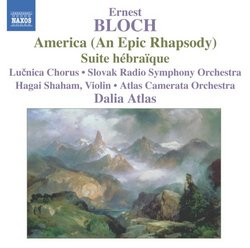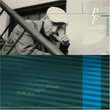| All Artists: Bloch, Slovak Rso, Hagai Shaham, Atlas Camerata Orch Title: Ernest Bloch: America (An Epic Rhapsody); Suite hébraïque Members Wishing: 1 Total Copies: 0 Label: Naxos Release Date: 6/21/2005 Genre: Classical Styles: Opera & Classical Vocal, Forms & Genres, Concertos, Instruments, Strings, Symphonies Number of Discs: 1 SwapaCD Credits: 1 UPCs: 747313215126, 074731321512 |
Search - Bloch, Slovak Rso, Hagai Shaham :: Ernest Bloch: America (An Epic Rhapsody); Suite hébraïque
 | Bloch, Slovak Rso, Hagai Shaham Ernest Bloch: America (An Epic Rhapsody); Suite hébraïque Genre: Classical |
Larger Image |
CD DetailsSimilar CDs
|
CD ReviewsNot for All Tastes J Scott Morrison | Middlebury VT, USA | 07/03/2005 (3 out of 5 stars) "Much as I wanted to like this recording of Bloch's 'America (An Epic Rhapsody)' I wasn't able to. First, the performance by an eastern European orchestra and chorus is clueless at best and downright sloppy at worst. Second, the piece itself is, for an American listener, almost embarrassing in its jingoistic and relatively naïve approach to limning America in music. One can certainly understand Bloch's sincerity and his wish to sing the praises of the country of which he had just become a citizen, but his means do not accomplish much that is memorable. The first movement -- '1620: The Soil - The Indians - (England) - The Mayflower - The Landing of the Pilgrims' -- is naïve in its use of supposed Native American themes. Reminiscent of Edward MacDowell's earlier 'Indian Suite,' it is not so well done. The second movement -- '1861-1865: Hours of Joy - Hours of Sorrow' -- makes awkward use of Civil War tunes and folksongs like 'Pop Goes the Weasel.' It's hard not to laugh at - not with - this section. The third movement - '1926: The Present - The Future (Anthem)' -- is rife with sounds of cars and factories and makes use of the kind of symphonic jazz used by such composers as Weill and Milhaud. It is the strongest movement, until it ends with a chorus intoning an anthem entitled 'America! America!' to words by Bloch himself. In performance Bloch meant it to be sung by the audience. The lines 'Our fathers built up a nation / To give us justice and peace / Towards higher aims, / Towards greater goals, / Towards freedom of all mankind' might, I'm afraid, turn to dust in our mouths in the current political circumstances. 'America' has also been recorded by Stokowski and Gerard Schwarz but I am not familiar with those performances. The twelve-minute 'Suite hebraïque' was written in 1953 and exists in four versions: violin/orchestra; viola/orchestra; violin/piano; viola/piano. We hear Israeli violinist Hagai Shaham (not as well-known as fellow Israeli violinist Gil Shaham, but obviously a talented instrumentalist) accompanied by the Atlas Camerata in a fine performance of this three-movement work that makes frequent use of Schelomo-like Jewish themes and harmonies. The first movement, 'Rapsodie,' is a bit lethargic in this performance, but 'Processional' and 'Affirmation' are nicely done. The main theme of 'Affirmation' has real potential to stick in one's mind's ear for hours. Dalia Atlas, an Israeli conductor who has made a specialty, we're told, of Bloch's music, leads both performances, the first by the Slovak Radio Symphony, the second by her own group, Atlas Camerata, an Israeli group made up primarily of Soviet emigrés to Israel. Scott Morrison" Entertaining David Saemann | 03/10/2008 (4 out of 5 stars) "The first thing to say about Bloch's America is that it is a Rhapsody, a Rhapsody with its roots in Liszt and Dvorak's Rhapsodies. That is to say it is tuneful, free form, and populist in its structures and techniques. This is not deep music. It is, however, frequently engrossing and hardly full of empty gestures. My first exposure to this piece was on a telecast by Lorin Maazel and the Cleveland Orchestra, an occasion mostly notable for the brightly colored vest Maazel was wearing. Atlas's version is altogether more winning. The string sound is rather dry, but the orchestra is well disciplined and in general effective in conveying Atlas's forward moving interpretation. I doubt you will feel America is a great work of Art, but in general it succeeds in what it attempts. As for the Suite Hebraique, this is a splendid example of Bloch's orientalism, with beautiful playing by the soloist and the orchestra. Not an essential purchase, perhaps, but definitely an enjoyable byway in the 20th Century orchestral literature."
|


